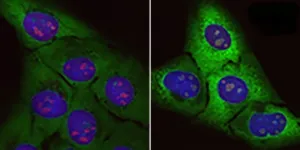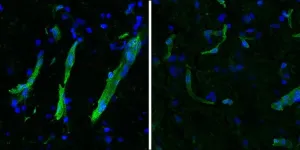(Press-News.org) UNIVERSITY PARK, Pa. — Eating one avocado per day may improve overall diet quality, according to a team led by researchers in Penn State’s Department of Nutritional Sciences. Poor diet quality is a risk factor for many diseases, including heart disease, and many American adults have poor diet quality and do not meet key dietary recommendations provided by the Dietary Guidelines for Americans.
This study was led by Kristina Petersen, associate professor of nutritional sciences, and Penny Kris-Etherton, retired Evan Pugh University Professor of Nutritional Sciences, and recently published in the journal Current Developments in Nutrition. The researchers examined how a food-based intervention — one avocado per day — impacts overall diet quality.
“Avocados are a nutrient-dense food, containing a lot of fiber and other important nutrients. We wanted to see if regular intake of this food would lead to an increase in diet quality,” Petersen said. “Previous observational research suggests avocado consumers have higher diet quality than non-consumers. So, we developed this study to determine if there is a causational link between avocado consumption and overall diet quality.”
Petersen stated that because only 2% of American adults are regular avocado consumers, the researchers wanted to determine if including avocados in an individual’s daily diet could significantly increase their diet quality.
Researchers conducted phone interviews with participants before the study began and at a few points throughout to determine what their dietary intake was like in the previous 24 hours and evaluated their diets using the Healthy Eating Index to determine how well they adhered to the Dietary Guidelines for Americans. Adherence to the guidelines was used as a measure of overall diet quality.
The study consisted of 1,008 participants who were split into two groups. One group continued their usual diet and limited their avocado intake during the 26-week study, while the other group incorporated one avocado per day into their diet.
“We found that the participants who had an avocado per day significantly increased their adherence to dietary guidelines,” Petersen said. “This suggests that strategies, like eating one avocado per day, can help people follow dietary guidelines and improve the quality of their diets.”
Although researchers said they were not surprised to see that eating avocados daily improved diet quality, they had not predicted how participants were able to achieve it.
“We determined that participants were using avocados as a substitute for some foods higher in refined grains and sodium,” Petersen said. “In our study, we classified avocados as a vegetable and did see an increase in vegetable consumption attributed to the avocado intake, but also participants used the avocados to replace some unhealthier options.”
According to Petersen, having poor diet quality substantially increases the risk for conditions like heart disease, type 2 diabetes, kidney disease and many other preventable diseases.
“By improving people’s adherence to dietary guidelines, we can help to reduce their risk of developing these chronic conditions and prolong healthy life expectancy,” Petersen said.
Petersen has also conducted similar studies investigating the impact of food-based interventions, including the relationship between pistachios and diet quality, but said that more research is needed to determine what other food-based strategies can be used to improve people’s adherence to dietary guidelines.
“In studies like this one, we are able to determine food-based ways to improve diet quality, but behavioral strategies are also needed to help people adhere to dietary guidelines and reduce their risk of chronic disease,” Petersen said.
Other contributors to the study include Sydney Smith and David M. Reboussin, Wake Forest University School of Medicine; Alice H. Lichtenstein and Nirupa R. Matthan, Tufts University; Zhaoping Li, David Geffen School of Medicine at the University of California, Los Angeles; and Joan Sabate, Sujatha Rajaram and Gina Segovia-Siapco, Loma Linda University.
The Avocado Nutrition Center supported this study. The funder did not influence the data analysis, data interpretation or writing of the published study.
END
An avocado a day may improve overall diet quality, researchers report
2024-03-22
ELSE PRESS RELEASES FROM THIS DATE:
CU researchers describe tools to better understand CaMKII, a protein involved in brain and heart disease
2024-03-22
AURORA, Colo. (March 22, 2024) – The health impacts of a complex protein that plays a major role in the development of Alzheimer’s disease and heart conditions can be lessened by three kinds of drug inhibitors, according to scientists at the University of Colorado Anschutz Medical Campus.
In an overview of the protein and the inhibitors published today in the journal Cell Reports, the CU researchers discussed the best ways to use the interventions.
The protein, CaMKII, is ubiquitous in cells throughout the body but is perhaps best known for its prominent role in the brain and the heart. It is critical in learning and memory but if misregulated can ...
Theoretical physicist Carlo Rovelli to receive 2024 Lewis Thomas Prize
2024-03-22
From photons to atheism to Churchill’s extraterrestrial musings, the stunning breadth of Carlo Rovelli’s work has spurred readers to think deeply about the intersection of science and culture, transforming staggering complexity into widely accessible writing along the way.
For this artful ability to educate and engage, Rovelli will be presented with the 2024 Lewis Thomas Prize for Writing about Science at The Rockefeller University on April 9. Named after its first recipient, noted physician-scientist and essayist Lewis Thomas, the prize was ...
Your dog understands that some words “stand for” objects
2024-03-22
It’s no surprise that your dog can learn to sit when you say “sit” and come when called. But a study appearing March 22 in the journal Current Biology has made the unexpected discovery that dogs generally also know that certain words “stand for” certain objects. When dogs hear those words, brain activity recordings suggest they activate a matching mental representation in their minds.
“Dogs do not only react with a learned behavior to certain words,” says Marianna Boros (@FamDogProject) of the Department of Ethology at the Eötvös Loránd University, Budapest, Hungary, one of the paper’s co-first authors. “They also don’t ...
Your dog understands that some words ‘stand for’ objects, new study shows
2024-03-22
It’s no surprise that dogs can learn to understand and respond to human words. Your dog can learn to sit when you say “sit” and come when called. But a new study has made the surprising discovery by recording brain activity that dogs generally also know that certain words “stand for” certain objects. When they hear those words, they activate a matching mental representation in their minds.
“Dogs do not only react with a learned behavior to certain words,” says Marianna Boros of the Department of Ethology at the Eötvös Loránd University, Budapest, Hungary. “They also don’t just associate that word with an object ...
Accumulation of 'junk proteins' identified as one cause of aging and possible source of ALS
2024-03-22
CNIO researchers provide a new hypothesis to understand the origin of amyotrophic lateral sclerosis, or ALS. It would be triggered by a similar problem to that occurring in a group of rare diseases called ribosomopathies.
In ALS patients, motor neurons would accumulate an excess of non-functional ribosomal proteins that eventually collapse the cell's clearance systems and cause toxicity.
The study also opens a new front in aging research. The authors provide experimental evidence that formally proves a kind of stress called ‘nucleolar stress’ cause aging in mammals.
Amyotrophic lateral sclerosis (ALS) is a degenerative disease. ...
Movement disorder ALS and cognitive disorder FTLD show strong molecular overlaps, new study shows
2024-03-22
On the surface, the movement disorder amyotrophic lateral sclerosis (ALS), also known as Lou Gehrig’s disease, and the cognitive disorder frontotemporal lobar degeneration (FTLD), which underlies frontotemporal dementia, manifest in very different ways. In addition, they are known to primarily affect very different regions of the brain.
However, doctors and scientists have noted several similarities over the years, and a new study in Cell reveals that the diseases have remarkable overlaps at the cellular and molecular levels, revealing potential targets that could yield therapies applicable ...
Patient characteristics and telemedicine use in the US, 2022
2024-03-22
About The Study: In this study of 5,437 U.S. adults with health care visits in 2022, many patients, including those with the greatest care needs, chose telemedicine even after in-person visits were available. These findings support continuing this care delivery approach as an option valued by patients. Differences were not observed by most common measures of socioeconomic status. Continued monitoring of telemedicine use is needed to ensure equitable access to health care innovations.
Authors: Eva ...
Racial and ethnic differences in telemedicine use
2024-03-22
About The Study: The results of this study of Medicare enrollees suggest that although nationally, Black and Hispanic individuals and individuals of other racial groups received more telemedicine visits during the pandemic and disproportionately lived in geographic regions with higher telemedicine use, after controlling for geographic region, Black and Hispanic individuals and individuals of other racial groups received fewer telemedicine visits than white individuals.
Authors: Felippe O. Marcondes, M.D., M.P.H., of Massachusetts General ...
Most new doctors face some form of sexual harassment, even after #MeToo
2024-03-22
More than half of all new doctors face some form of sexual harassment in their first year on the job, including nearly three-quarters of all new female doctors and a third of males, a new study finds.
That’s actually down somewhat from the percentage of new doctors who experienced the same five or six years before, according to the paper published in JAMA Health Forum by a team from the University of Michigan Medical School and Medical University of South Carolina.
And today’s ...
Researchers propose a new way to identify when babies become conscious
2024-03-22
Academics are proposing a new and improved way to help researchers discover when consciousness emerges in human infancy.
When over the course of development do humans become conscious? When the seventeenth-century French philosopher René Descartes was asked about infant consciousness by his critics, he eventually suggested that infants might have thoughts, albeit ones that are simpler than those of adults. Hundreds of years later, the issue of when human beings become conscious is a question which remains a challenge for psychologists and philosophers alike.
But now, in response to a recent ...


